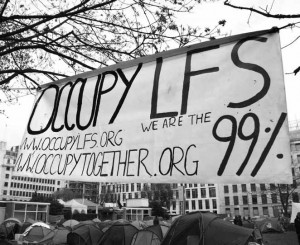 This week we debate the Occupy movement’s use of the phrase ‘We are the 99%’. Does the statistical accuracy matter or does its powerful symbolism override this problem?
This week we debate the Occupy movement’s use of the phrase ‘We are the 99%’. Does the statistical accuracy matter or does its powerful symbolism override this problem?
FOR: Robert Phillips
So where did all this come from? A New York activist coined the ‘We Are The 99%’ political slogan as part of a Tumbler blog in August this year. People began posting videos or photos of themselves with a piece of paper telling their story which would end in ‘We Are The 99%’, eventually becoming an Internet meme and later being adopted by the Occupy movement. But it can be traced back further still. Joseph Stiglitz wrote a Vanity Fair article back in May entitled “Of the 1%, by the 1%, for the 1%” in which he claimed the richest 1% of Americans control 40% of the wealth, filmmaker Jamie Johnson made a documentary called ‘The One Percent’ in 2006, and Al Gore went at George W. Bush during the 2000 Presidential candidate debate, accusing him of supporting the “wealthiest one percent” ahead of everyone else. Even before that, SMU Professor of Economics Ravi Batra reached #1 on the New York Times bestseller list with a book in which he linked the concentration of wealth “held by the richest 1%” to speculative manias and depression.
So it has some history, but is it strictly accurate? Probably not. Does that matter? Perhaps, but perhaps not. While the figure might be a little off, and the division of wealth and privilege is far more complex than any one-line slogan can illustrate, ‘We Are The 99%’ has helped achieve something most of the left could only dream of for the past 30 years.
We’ve all known all along that the world is disgustingly unfair; with individual fortunes running into the tens of billions while others on the planet go without drinking water. Yet getting such grotesque inequality onto the political agenda has been almost impossible. Instead we’ve had to chisel away at smaller elements of the bigger issue, all why the wealthy got disgustingly richer.
Now we are actually looking at the big picture and having the real conversation about what is wrong with the world, in part thanks to a memetic slogan, which,while imperfect, has managed to catch the attention of the wider public and alert them to the severity of the situation.
AGAINST: Zoe Stavri
The number is arbitrary. It comes from some 2007 figures: that 1% of Americans control 43% of financial wealth – this leaves everyone else in the 99%. This figure highlights a wealth disparity of which many were previously unaware. And yet, the 99% cut off is arbitrary. If one moves figures around, a more interesting picture emerges.
The top 5% of earners in the USA control 72% of financial wealth. Shifting focus from “we are the 99 per cent” to “we are the 95%” reveals a more shocking inequality: almost three quarters of financial wealth is controlled by a tiny fraction. The bottom 80% of earners in the US controls just 7% of financial wealth, a negligible sum.
Less than 14% of the top 1% work in the finance industry, hardly the cartel of bankers that the slogan portrays. Quite a few Wall Street workers would probably find themselves in the 99%: the earning cut-off to be in the top percentile is just under $600 000, the average salary on Wall Street is $396 000. Shifting from “we are the 99%” to 95% or 80%, this embarrassing little fact disappears.
Why 99% rather than 95% or 80%? These figures still cover almost everyone. Revising it down slightly – to the threshold for statistical significance–the statement can be made better. There are also two elephants in the room regarding how the “we are the 99%” figure is used. Firstly, it neglects broader issues about race and gender wealth inequalities; a crucial issue which requires tackling head-on, yet it is hand-waved away with a broad-brush slogan, sacrificing what could be a very important statement to make in favour of mass appeal.
Secondly, “we are the 99%” applies to US-specific, not global inequality. Under global inequality, earners of the US median wage suddenly find themselves in the top 1%. No longer the “moral majority”; they are part of that tiny fraction which controls most of the wealth in the world. If Occupy Wall Street is truly part of a global movement, this issue needs to be addressed.





